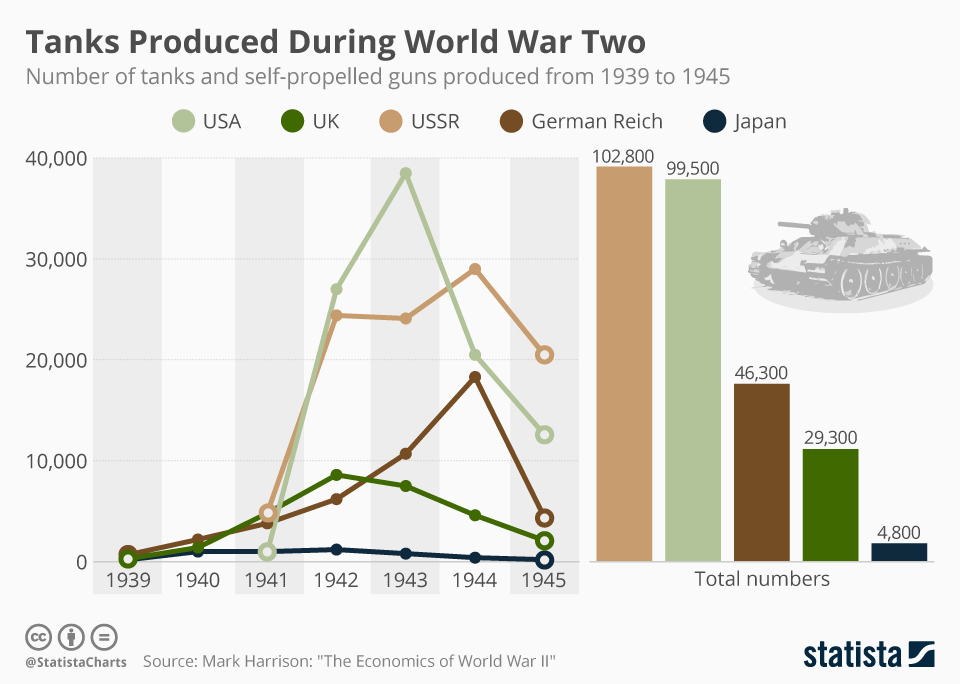A large number of very interesting questions have arisen, and they are despite appearances to a great extent linked. So starting with the situation in the Soviet Union, and looking at both sides, here is my personal take. Germany which started the war with no clear path to winning, and thanks to the Nazis, had one of the most dysfunctional government administrations and military leadership in the world. Has without defeating the largest empire in the world, which has virtually unlimited access to all the resources it needs, and access to the productive capacity of the world’s largest industrial power. And has managed to cut off German from access to a number of vital resources, and any overseas markets, while resisting German efforts to impose a blockade on the UK. Note German started the war with a Navy that was a fraction of the RN, and had roughly a quarter of the submarines that the RN had, and it’s principal long range four engine bomber the FW Condor an adapted civilian airliner. Was inferior in range, bomb load and structural strength, to Britain’s worst four engines bomber, the Short Sterling, which was built in the thousands unlike the Condor of which less than three hundred were built. Instead of concentrating its efforts on eliminating the British, it decided to invade with totally inadequate resources and criminally inadequate preparation. The largest land empire in Europe, the Soviet Union, which was at the time one of its major suppliers of strategic materials, such as oil, grain and minerals. It made no preparations for the supply of its invasion force, such as building coasters to take advantage of the Baltic Sea, or a cheap and basic steam engine such as the British did with their austerity engines. Instead of establishing a single authority to control all railways in Germany, Poland and the captured territories, it had three that were constantly at war with each other. In the same way it failed to develop a single standard 3 ton truck, which all of its and the captured truck manufacturers could produce, so that there was just one single vehicle used by all, and thus a very small supply chain for spares. Instead they went with the most diverse collection of trucks available, and one that required the largest spears inventory in the history of the world. Nor did they prepare for the massive task of regauging the Soviet railways from their wider gauge to the narrower standard gauge. With thousands of allied prisoners of war and thousands of political and other detainees, they could have formed work gangs under an experienced German railway engineer and worker, to carry out this vital task.
As for the Soviets especially the leadership, after the initial shock of the German invasion, they soon came to realise that they couldn’t afford to surrender or seek peace with the Germans. As either the Germans or their own people would soon put them up against the nearest convent wall and shoot them, if they didn’t beat them to death or string them up from a lamppost. So the entire leadership knows that if they don’t stand together and continue to fight to the bitter end, they will surely swing together. As the Soviet Union disintegrates much as did the Russian Empire when it sewed for peace in 1917, and Russia fell into the Revolution. Having managed to defeat the initial onslaught, and evacuated the majority of Soviet industries beyond the reach of the Germans, the Soviets while struggling are for now pretty much secure. And with increasing domestic production and Lend Lease, are beginning to reach the stage where they can start their fight back. Why the Germans who couldn’t stop the British from sailing convoys through German controlled seas and skis, were they were dominant in the air and sea. Thought that they were going to be able to blockade the UK, beggars belief, any sane rational person would have realised that they stood no chance, and that they were just wasting time and resources. The fact that the Japanese decided not to get involved in the German campaign against the Soviets, and continued to allow Soviet ships carrying none military cargoes to sail though Japanese dominated waters, should have told them Germans something. With near total control over the information that the Soviet people received, and a strong ruthless secret police force, ready to remove any one not showing total loyalty from the population. And more than ready to either dispose of them, or transport them to a gulag, the Soviet people had no choice but to believe and work towards the final victory. While the propaganda organisations of the state, pushed a constant narrative that the great sacrifice was necessary for final victory, and anyone who disagrees is a slacker or worse an agent of the Nazis. They even allowed the reintroduction of religion into the nation, as people were encouraged to pray for the nation and its leaders. The worry that a lot of westerners especially in the government had, that the Soviets were going to collapse and seek a separate peace, were predicted on a complete misunderstanding of the reality of Soviet political power, and what had happened in 1917. Stalin and his regime were riding on the back of a very angry bear, and any attempt to get of would see him ripped apart as would any of his regime that joined him.
The British manpower situation is as is along with its general situation much better ITTL than it was IOTL. She hasn’t suffered the major losses that she did IOTL, and has been able to reduce her manpower requirements slightly for the moment and thus induct less men from her industry workforce into the services. Plus she has been able to maintain a higher standard, and not need to scrap the bottom of the barrel, and induct men who were physically or mentally unfit on the same scale as she did historically. Until Britain becomes involved in a significant way in large scale operations on the European mainland, she can and will continue to maintain a lower level of call up, with the age of skilled men who are granted exemption from service being lower for the meantime. And the major expansion of the call up not taking place until the summer of 1943, and the serious manpower shortage not occurring until 1945, if it does. The war in the East will be fought by mostly Indians, as it was IOTL, supplemented by colonial Africans and locals from Burma and Malaya, with a smattering of locals from FIC. Few if any people from the DEI, will serve outside their own country, and then only in Borneo, not Thailand, Indochina, or the Philippines. Tank production in Britain will be roughly the same as it was IOTL, but the tanks produced will be far superior to those of OTL, and thus reducing the requirement for American tanks. Britain will produce more of its own trucks, as up until the major requirements of a land campaign in Europe, it can put aside a percentage into reserve. When we look at the bombing campaign, we have to look at the reasons why it exists, not just what makes sense from our perspective. Pre war all of the major powers in the world had believed to a greater or lesser extent, that is was possible to win a war with bombers alone. However only the UK and the USA, actually developed bombers that in theory could achieve this against a major power. Non of the Axis powers managed to develop a true heavy bomber, or had the ability to produce them in the numbers needed, or if they had them, support them with all the materials required. Just think about how much fuel a thousand bomber raid along with its supporting raids required, and not just on one night, but night after night. It probably burnt enough fuel to keep a German panzer division in action for a month.
Britain will continue to develop its bombing strategy, and will in time be accompanied by the Americans, as the two airforces try to accomplish what the inter war theories suggested was possible. Britain also wanted revenge for the bombing of her cities during the blitz and the nuisance bombing in the years since, such as the Baedeker raids which are due to start soon. The appointment of Harris as AOC Bomber Command if it takes place ITTL as it did IOTL, will place a true believer in the bomber theory, and highly skilled administrator skilled in the ways of Whitehall, in the place where he can make all the bomber barons dreams come true. It took time and major effort to change a rag tag force, into the slick and powerful force that Bomber Command was to be, IOTL, able with the assistance of its allies in the American 8th Airforce, to totally devastate any target in chose to. Remember the most destructive raids of the war in Europe tended to be combined operations between the two forces, such as Hamburg and Dresden. I always find it annoying that Harris and the RAF get all the blame for Dresden, and the 8th’s contribution is overlooked and forgotten about. Nor do people remember that the most destructive air raid in history was conducted by the Americans on their own and wasn’t either of the atomic bomb raids, but rather the fire bombing of Tokyo. The only thing that might reduce the intensity of the British bombing effort against Germany, is if a substantial number of heavy bombers are diverted to the Mediterranean or Far East. Other than that, up until the heavies are diverted to the support of the upcoming invasion of France, or suppression of the V-Weapons if they are built and used. Germany is going to be subjected to an ever increasing rain of destruction from the air, by first the British, and then the Americans. The Americans just have to get over their fixation with precision daylight bombing, that’s great on the bombing ranges in the clear blue skies of Texas. But doesn’t work in cloudy rainy Central Europe, or over the pollution haze/smog of the Ruhr Valley in Germany. Up until the Americans started using British electronic navigation aids, the British were able to more accurately bomb by night, GEE, Oboe and the pathfinder force produced much greater accuracy, than swanning around in large combat boxes were only the lead bombarder could actually aim at the target, and the rest of the surrounding group bombed at his signal.
RR.



